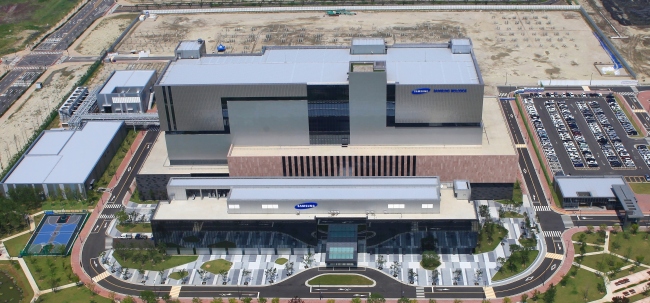Samsung Group is pouring resources to spur its lackluster biotechnology business as its next growth engine.
Samsung BioLogics, the group’s pharmaceutical unit, said Thursday it would issue new shares worth 146.1 billion won ($133 million) this month and use the secured cash on plant expansion and ongoing biosimilar projects.
Cheil Industries and Samsung Electronics ― the group’s two key affiliates ― own 45.65 percent and 5.75 percent of shares in the company, respectively.
 |
| A rendering of Samsung BioLogics’ new manufacturing complex. (Samsung BioLogics) |
Samsung BioLogics, based in Songdo, Incheon, is a contract manufacturer for global pharmaceutical companies like Bristol-Myers Squibb and Roche. With the $700 million expansion work at its plant completed by 2016, its production capacity could reach 180,000 liters per year from 2017, the world’s third largest after Swiss’ Lonza and Germany’s Boehringer Ingelheim.
Samsung is also poised to jump into the biosimilar business. Biosimilars are cheaper, generic versions of expensive biotech drugs that are made from living cells.
Even though the biotech drug market is dominated by big-name companies, staggering growth is expected as the patent period of some key brands such as the arthritis drug Enbrel will expire soon.
Samsung BioEpis, which is 90.3 percent owned by Samsung BioLogics, is already working on seven biosimilar projects, injecting more than 200 billion won into each.
The company has inked a deal with Merck for the distribution and sales of the Samsung drugs.
“Samsung BioLogics has grabbed investors’ attention as its largest shareholders are Cheil Industries and Samsung Electronics,” an industry source said. “The company will continue to gain strong support within the group.”
Despite the recently enhanced investments, the biotech business has suffered operating losses over the past years.
Samsung Biologics posted an operating loss worth 146.3 billion won last year, more than a tenfold increase from 12.2 billion won in 2011. Cheil Industries, its largest shareholder, hinted that the unit could see a turnaround from 2017.
“Samsung is still pouring money into facilities and R&D. It will take two or three more years for the investment to see profitability,” said another source.
Meanwhile, there is also speculation that a new holding company combining the group’s health care businesses could be set up soon under the leadership of Samsung Electronics vice chairman Lee Jay-yong, the group’s de facto leader.
The tech giant has also operated its medical equipment division. Samsung Medison, the ultrasound machine manufacturer, is expected to be merged with the division as part of the group’s efforts to streamline its business portfolio.
A new road map could be unveiled during Samsung Electronics shareholders’ meeting in March, industry watchers said.
By Lee Ji-yoon (jylee@heraldcorp.com)

